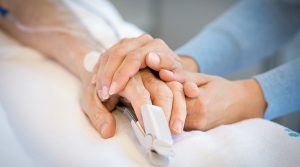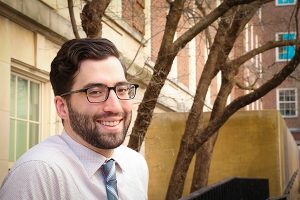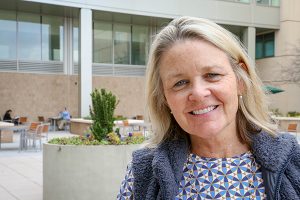 Patients sometimes die in our hospital. Some have friends and family to help them pass. For others, the realities of life may mean that they have no one to offer comfort and companionship in their final moments.
Patients sometimes die in our hospital. Some have friends and family to help them pass. For others, the realities of life may mean that they have no one to offer comfort and companionship in their final moments.
“People sometimes linger,” says Patricia Cadle, MRE, a former clinical chaplain who retired from UNC Medical Center in November of 2017. “And their families are not always able to wait with them until it’s time for them to pass, whether that’s because their family is traveling back and forth from a long way off, or because they are only able to come back on the weekends but no one can be there during the week because of their responsibilities at home, or because they just don’t have anyone”
The No One Dies Alone (NODA) program, which Cadle helped to administer before her retirement, offers companionship and comfort to such.
The program has been at UNC Medical Center in one form another for over a decade. Linda Bowles, director of Volunteer Services at UNC Hospitals, recognized the value of the program immediately.
“When I saw this program I knew that it would fit into our culture here. We get requests for NODA volunteers from all over the hospital and it’s a program that involves the cooperation of a lot of different groups — volunteer services, hospice, palliative care, social work, the hospitalists, the nurses, and more.
The program works like this: If it appears that a patient is in their final 72 hours of life, hospital staff can contact Volunteer Services, who then reach out to volunteers who have received specialized training in end of life care from pastoral staff and arrange to for them to be at the bedside. NODA volunteers are available no matter the time of day.
Alexander Gunn is one of the 32 trained volunteers currently with the program. He first heard about NODA during a UNC Hospitals volunteer training session and signed up for the more rigorous training. He recalls being “incredibly nervous” the first time he found himself at a patient’s bedside as a NODA volunteer, but says his own experience helped him master his nerves so he could “be present for the experience.”

“It’s about finding a way to be there with a clear mind and an open heart. The first time I did it, I was thinking about when my grandmother passed. You are holding vigil for the family who can’t be there and honoring the person in front of you. It’s about the transition.”
Most of the patients Gunn has encountered have been unresponsive – as are many of the patients NODA volunteers are called upon to visit with – but he says he does his best to make sure they know he is there.
“Usually I enter the room, I introduce myself and tell them I’m going to sit with them for a few hours. I always make a point to hold their hands and to let them know I’m there.”
Cadle says that this kind of attention can be meaningful not just for the patient but also for their family. “For family members to have that relief and comfort to know that someone is with their loved one, it’s a gesture that honors their loved one’s life and dignity. It matters. To be allowed to be in that space, to be invited into that space. It’s a privilege. And our volunteers recognize that.”
Heidi Gessner, MDiv, BCC, who currently coordinates NODA for the pastoral care department, says that programs like this demonstrate that we recognize there is more to these people than their diagnosis and its progression.
“People matter until the very end of their lives,” says Gessner, who is also the bereavement coordinator and palliative care chaplain at UNC Hospitals. “We put value on our patients’ lives. A lot of our volunteers are former hospice nurses, physicians, medical students, people who are natural caregivers and have been their whole lives. It’s just such a natural fit to put these volunteers with these patients.”

Gunn says that providing this service to others in their final moments has had a profound effect on him.
“It does affect me and it’s challenged me to think more about mortality and what it means to give care, compassionate care, to someone. It’s grown a side of me that I’ve never encountered.”
In addition to putting the humanistic ideals of medicine into action, the volunteers can also have a practical benefit to the unit as a whole. Cadle explains:
“Having these volunteers at the patient bedside frees up the nurses to care for other patients that are actively in treatment. The nurses don’t have to worry about this person because there is someone watching them. And the volunteer can tell the nurses any changes that they see in the patient.”
These volunteers can also eliminate some of the emotional burden on nurses who may wish to sit with patients and help ease their passing but who are unable to do so because of their responsibilities to other patients in their care. Having a NODA volunteer at the patient’s bedside can offer peace of mind in under such circumstances.
Making the best use of the resources available has helped NODA’s mission to blossom into something more widely applicable. NODA volunteers are only called in around a dozen times a year, but Donna Daniel, the UNC Medical Center volunteer coordinator who facilitates the NODA program, also frequently receives phone calls from nurses and other staff members requesting volunteers just to sit with people and keep them company. The NODA volunteers weren’t the right fit for these patients, but clearly there was a need that was going unmet.
Out of this recognition, the Compassionate Companions program was born.
Of all the potential discomforts that come with a hospital stay, the isolation of the experience is not one that often springs immediately to mind. A hospital stay can be boring, extend it for a few days or a few weeks and it has the potential to become pretty lonely also.
The Compassionate Companions are available to help alleviate some of this by providing patients with some company while they pass the time.
“When they arrive on the unit, the volunteer may sit there and play cards with a patient, or they may get up and walk around the unit. It’s really just about spending time with someone and making a connection,” says Gessner.
The Compassion Companions are trained less extensively than the volunteers in the NODA program – the Compassionate Companion training is just a few hours while the NODA is a full day – but they nevertheless offer a valuable service to those who request them.
The duties of the NODA volunteers and those in the Compassionate Companions are very different, as are the populations they serve, but both programs have an important role to play in the life of the hospital.
“It shows that we, as an organization, care,” says Cadle. “That this program is allowed to be here, that we train people to be here to do this kind of work, it says that we are interested in that person. That person is not just a body we are practicing medicine on – they are a body, a mind, and a spirit. Caring for each of those is important.”
If you have a patient who would benefit from NODA’s services or know someone who would like to volunteer with the program, contact Volunteer Services at (984) 974-4793 or volsvcs@unchealth.unc.edu. The next NODA training is Sept. 12.
by Matt Englund, matthew.englund@unchealth.unc.edu